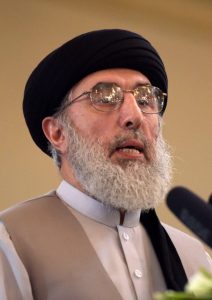Return of warlord Hekmatyar adds to Afghan political tensions

When the fugitive warlord Gulbuddin Hekmatyar returned home to a lavish official welcome last month, abandoning his 16-year insurgency and forgiven for a history of wartime abuses, he was -expected to quickly take up the cause of peace and set a conciliatory example for Taliban insurgents.
Instead, the fiery Islamist leader has landed like a bombshell in the roiling world of Afghan politics, publicly insulting President Ashraf Ghani, reneging on a pledge to disarm several thousand loyal fighters, and leaving the stunned capital wondering if inviting him back was a huge mistake.
He has made few public refer¬ences to the Taliban, except to call them “brothers” and suggest that they share a common cause in wanting to rid Afghanistan of foreign troops. So far, though, the insurgents have ignored his return after denouncing him last fall as a traitor in the wake of the peace deal with Ghani.
The most optimistic interpretation of Hekmatyar’s behavior is that he is reestablishing his tough, anti-Western credentials to impress the Taliban, who have been steadily gaining ground on the battlefield and have shown no appetite for restarting peace talks. He has said he seeks to build bridges across Afghan society and use his influence to end the conflict.
To some observers, though, it looks as if the canny strongman is using the peace deal as a vehicle for his long-thwarted political ambitions. They fear that instead of collaborating with the government that offered him amnesty and full entree into public life, he intends to forge an array of opponents — especially fellow Pashtuns who feel left out of power — to challenge the struggling government and possibly force Ghani from office. Quoted from (Washington Post).
So far, few Afghans have spoken out against Hekmatyar’s return, but there is a growing sense that the honeymoon is already over. Government officials have been silent, though several privately expressed shock and anger at his comments. Hekmatyar has issued no recent statements, and aides who were ¬accessible during the run-up to his arrival have become unreachable.
“We welcomed the peace deal, but instead of surrendering to the government, Mr. Hekmatyar is acting as if the government has surrendered to him,” said Mohammed Atta Noor, a provincial governor from the rival Jamiat-i-Islami party. “We should give him a little time. If he wakes up and accepts democratic principles, everyone will welcome it, but if he sticks to this provocative behavior, it will not be good for Afghanistan’s future.”
“The truly brave thing for him to do would be to apologize to the Afghan people,” said Sima Samar, head of the Afghan Independent Human Rights Commission. “If he is strong enough to do that, it will heal a lot of wounds and distance people from revenge. It may even help bring peace.”